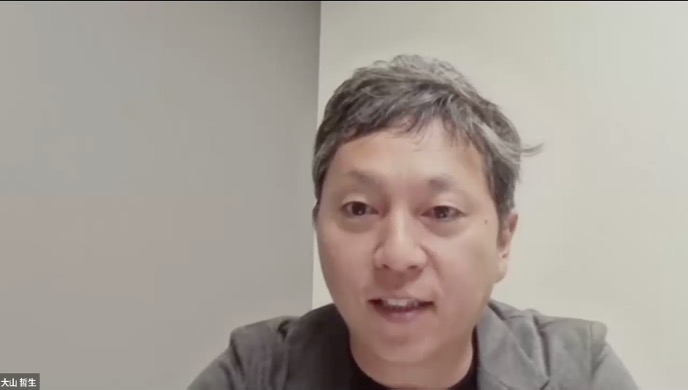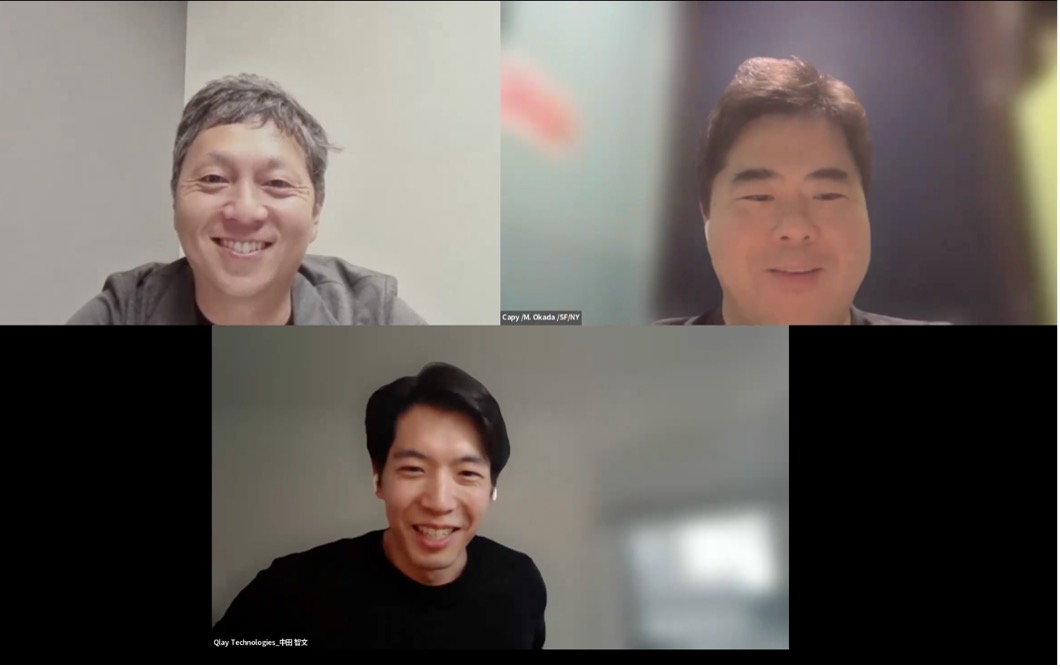On June 24th, X-HUB TOKYO, a platform which supports overseas expansion of Tokyo-based startups, held the FY2025 X-HUB TOKYO #1 Overseas Expansion Seminar titled “Exploring the Latest U.S. Market Trends ~Startup Ecosystems of New York and Silicon Valley~.”
The seminar focused on New York and Silicon Valley —two of the most prominent startup hubs in the U.S.— and explored the latest trends in the American startup ecosystem, as well as specific business opportunities for companies aiming to expand internationally.
In the first half of the event, Mr. Tetsuo Oyama, Vice President of Pasona N A, Inc. provided an overview of the unique characteristics of both New York and Silicon Valley. He also discussed important considerations for entering these markets, taking into account the current political and economic climate in the U.S.
In the latter half, Mr. Oyama facilitated a panel discussion with Mr. Tomofumi Nakata, CEO of Qlay Technologies, Inc., and Mr. Mitsuo Okada, CEO of Capy, Inc.—both of whom have business operations in the U.S. They shared practical insights and valuable lessons learned from their experiences in the American market, along with advice for entrepreneurs looking to expand overseas.
Introduction to the New York Silicon Valley Ecosystem
 Pasona N A, Inc. Vice President
Pasona N A, Inc. Vice President
Mr. Tetsuo Oyama
- To begin, we would ask Mr. Tetsuo Oyama, Vice President of Pasona N A, Inc., to share his insights on the current economic and political climate in the U.S. —essential information for startups considering expansion into the U.S. market.
-
As many of you may know from news reports, political uncertainty is increasing in the U.S. as of June 2025. Geopolitical risks—including changes in tariff policies and heightened tensions between Iran and Israel—are directly affecting business activities. This growing instability is a crucial factor that foreign startups aiming to enter the U.S. market cannot afford to ignore.
Meanwhile, from a global perspective, Japan’s relative economic power is undeniably declining. For instance, by 2024, California alone has surpassed Japan in GDP (in dollar terms), ranking fourth worldwide. This is a symbolic event, highlighting that “overseas expansion” is no longer just an option for Japanese startups—it has become an essential strategy for growth. Among potential destinations, the U.S. remains one of the most attractive and promising markets for expansion.
- What are the characteristics of the startup ecosystems in New York and California?
-
California—particularly Silicon Valley—boasts a high concentration of venture capitalists (VCs) and angel investors, creating an ideal environment for startups that require significant initial investment, such as those in deep tech, AI, and energy sectors. However, California is also known for having some of the strictest labor regulations in the United States, so it is essential for companies to thoroughly understand local employment practices and the legal system when hiring.
New York, on the other hand, excels in the B2C sector and fintech, supported by its extremely high population density and diverse demographics. The city’s concentration of major corporations and financial institutions provides startups with close access to potential business partners and customers, enabling a fast-paced development environment.
- What are the key points for a startup to succeed in the U.S. market?
-
There are three main factors to consider: legal requirements such as visas, managing political risks, and leveraging AI.
First, it’s crucial to understand the process and requirements for obtaining the appropriate visas. Second, keeping a close eye on political risks is increasingly important. Given the current climate of uncertainty, it’s essential to actively monitor changes in policies and international relations that could impact your business.
Third, the use of AI is not just about adopting new technology—it’s also about integrating it into your human resource strategies. Today, many investors are focused on how startups can use AI to supplement or even replace existing operations and personnel. As a result, future organizational structures and hiring practices will need to be flexible and built around a strong understanding of AI.
When planning overseas expansion, startups must take a holistic approach, considering geographical factors, regulatory environments, and economic and social trends. With these considerations in mind, we believe that the U.S. continues to offer immense potential and remains an attractive market for startups.
Panel discussion with Experienced Entrepreneurs
 From top left, Mr. Tetsuo Oyama, Vice President, Pasona N A, Inc.
From top left, Mr. Tetsuo Oyama, Vice President, Pasona N A, Inc.
Mr. Tomofumi Nakata, CEO, Qlay Technologies, Inc. (bottom center)
Dr. Mitsuo Okada, CEO, Capy Inc (top right)
- In the second half of the session, Mr. Tetsuo Oyama, Vice President of Pasona N A, Inc., continued as the facilitator, with Mr. Tomofumi Nakata, CEO of Qlay Technologies, Inc., and Dr. Mitsuo Okada, CEO of Capy, Inc., joining as panelists.First of all, please introduce yourselves and tell us about your current business activities in the U.S. market.
-
Mr. Nakata: I founded Qlay Technologies in 2023 to provide AI-based recruitment assessment and global recruiting services. We use AI to automate initial interviews, coding tests, and resume screenings, matching highly qualified candidates with companies in Japan, the U.S., and Europe. Although we started out in Japan, we moved our headquarters to the U.S. after just one year because of the business’s growth potential and the size of the market here. Currently, based in Silicon Valley, I’m building a system to connect talented engineers across Asia, Africa, and South America on a global scale.
Dr. Mitsuo: Our company, Capy, is a startup that offers cyber security solutions, mainly focusing on online authentication and anti-bot measures. I am currently based in both the SoMa district of San Francisco and Midtown New York, working to expand our network of customers and investors in the U.S. and beyond, and driving our business development efforts.
- What gaps or challenges have you encountered while developing your business in the U.S.?
-
Mr. Nakata: Compared to Japan, two major differences stand out: the “difficulty of sales” and “fierce competition.” In the U.S., it’s common for emails and phone calls to go unanswered. I realized that building trust through networking and introductions is crucial. In our industry, there are many AI-related startups, making the competition extremely intense. I’ve learned that it’s important not only to focus on the technology itself but also on how you deliver it and the story you tell.
Dr. Okada: I was struck by the speed and scale of the U.S. market, especially how quickly decisions are made and how dense the networking is. For example, when I attend meetups and pitch events in San Francisco, I can have in-depth conversations with multiple investors and industry professionals within just one or two hours. The speed, as well as the quality and quantity of information, is hard to find elsewhere. I’ve experienced firsthand the dynamism of business opportunities being created on the spot.
- Finally, what advice would you give to startups considering entering the U.S. market?
-
Mr. Nakata: I have two main pieces of advice. First, focusing on both the U.S. and Japanese markets at the same time requires more energy, time, and money than you might expect. The time zone difference means frequent late-night meetings, which can be exhausting. From my own experience, it’s important to strategically decide which markets to focus your resources on and when. We regularly host events with VCs and startup professionals, and recently we had over 350 people register. Hosting your own events is a great way to raise your company’s profile and build relationships in your own context.
Dr. Okada: In the U.S., everyday life itself is a learning experience. One of the most important things is to actively engage with the local community. When I attend local events, I sometimes meet key industry figures, and I try to give an elevator pitch on the spot to spark their interest. These encounters help expand my network and open new doors.
I also feel it’s important to experience and adapt to the differences in lifestyle, culture, and work compared to Japan. Above all, one advantage of San Francisco is that there aren’t many distractions, so I can focus on my work (laughs).
I encourage everyone to dive into the U.S. market in your own style.
- Thank you very much for sharing your valuable experiences and advice!
- In this event, above panelists have introduced the features and attractions of New York and Silicon Valley as the latest trends in the U.S. market. Moving forward, X-HUB TOKYO will continue to provide the latest information on the characteristics and attractions of overseas startup ecosystems, as well as strategic approaches for expanding abroad.

